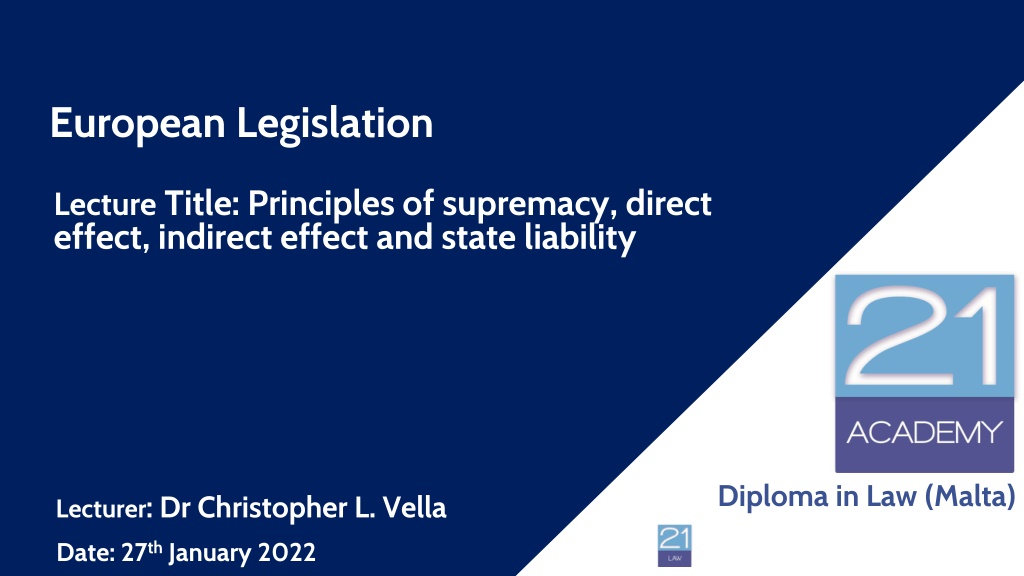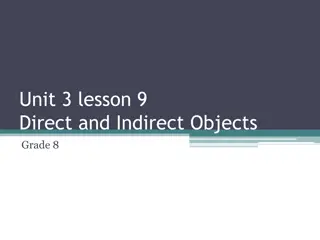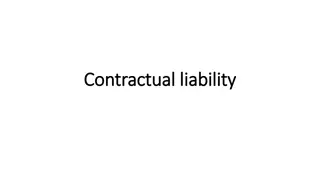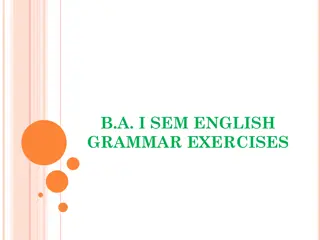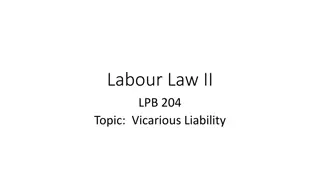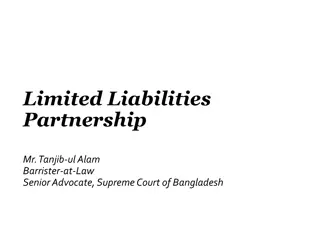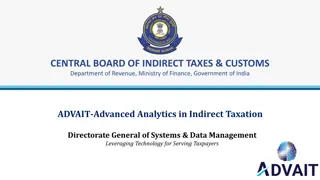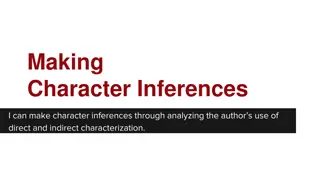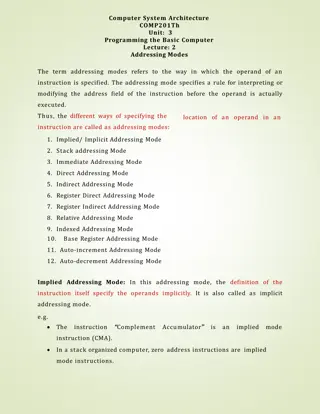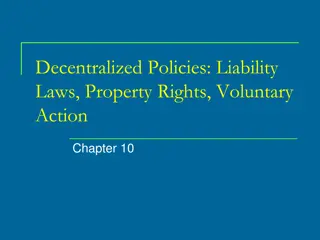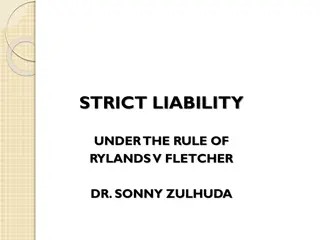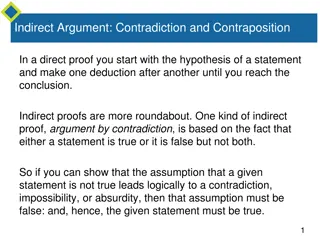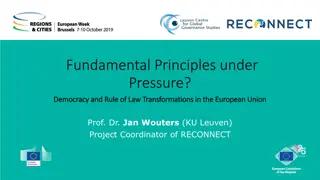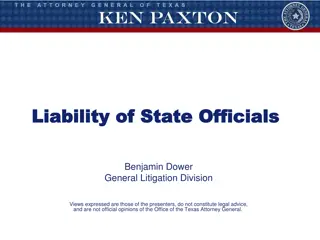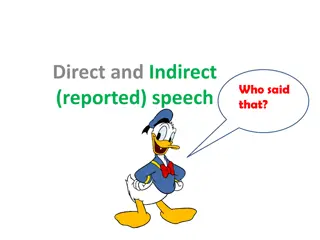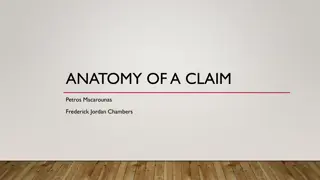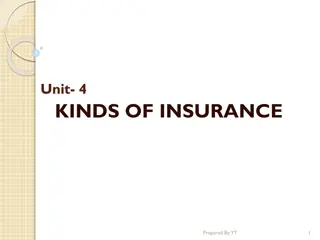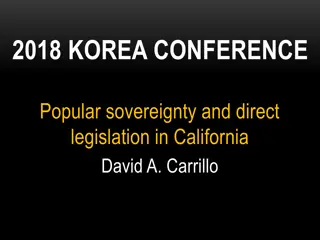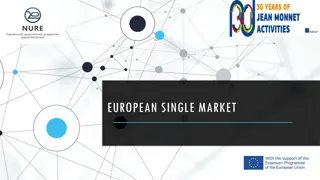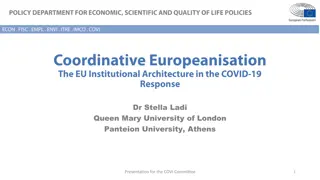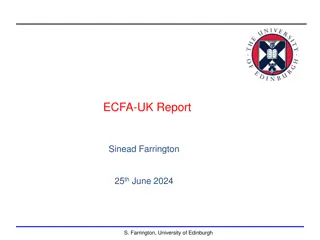Principles of Supremacy, Direct Effect, Indirect Effect, and State Liability in European Legislation
This lecture delves into the essential principles of supremacy, direct effect, indirect effect, and state liability within European Legislation, focusing on the foundational aspects and development by the CJEU. It emphasizes the concept of EU law's absolute supremacy over national laws for the achievement of a uniform common market and effective integration. The rationale for supremacy is justified through Contractarian, Functional, and Analytical arguments, highlighting the necessity of upholding EU law for coherence and functionality within the Union.
Uploaded on Jul 22, 2024 | 2 Views
Download Presentation

Please find below an Image/Link to download the presentation.
The content on the website is provided AS IS for your information and personal use only. It may not be sold, licensed, or shared on other websites without obtaining consent from the author. Download presentation by click this link. If you encounter any issues during the download, it is possible that the publisher has removed the file from their server.
E N D
Presentation Transcript
Diploma in Law (Malta) Click to edit Master title style European Legislation Click to edit Master text styles Second level Third level Fourth level Fifth level Lecture Title: Principles of supremacy, direct effect, indirect effect and state liability Diploma in Law (Malta) Lecturer: Dr Christopher L. Vella Date: 27thJanuary 2022
Diploma in Law (Malta) Click to edit Master title style Click to edit Master text styles Second level Third level Fourth level Fifth level Part I: Principle of supremacy
Diploma in Law (Malta) Click to edit Master title style Supremacy of Union Law Founding treaties were silent on this principle Click to edit Master text styles Second level Third level Fourth level Fifth level Law? Which law prevails in case of conflict between National and EU EU LAW IS ABSOLUTE AND UNCONDITIONALLY SUPREME All sources of EU law prevail over national laws
Diploma in Law (Malta) Click to edit Master title style Development by CJEU Developed by the CJEU in Flaminio Costa v Enel (Case 6/64) Click to edit Master text styles Second level Third level Fourth level Fifth level By creating a Community of unlimited duration, having its own institutions, its own personality, its own legal capacity and a capacity of representation on the international plane and, more particularly, real powers stemming from a limitation of sovereignty or a transfer of powers from the States of the Community, the Member States have limited their sovereign rights, albeit within limited fields, and have thus created a body of law which binds both their nationals and themselves
Diploma in Law (Malta) Click to edit Master title style Rationale for supremacy A uniform common market could not be achieved if EU Law is subordinate to national law of the various states. Click to edit Master text styles Second level Third level Fourth level Fifth level 1. Contractarian Argument: Flowed from the Accession Agreements by transferring certain competences to the EU, Member States have limited their sovereignty. National courts are required to give effect to EU law 2. Functional Argument: Aims of integration and cooperation would not be achieved if one MS refuses to give effect to Union Law. Uniformity. 3. Analytical Argument: In practice the direct applicability of EU Law would be meaningless if MS were permitted to nullify the effects of EU Law by national legislation
Diploma in Law (Malta) Does EU Law prevail over all laws? What about Click to edit Master title style constitutional rights or Human Rights? Click to edit Master text styles Second level Third level Fourth level Fifth level Not even a constitutional provision could override the supremacy of EU Law. Internationale Handeelgsgellschaft vs Einfuhr (1970) (C-11/70) Not even a fundamental human right Ciola v Land Vorarlberg 1999 Not even administrative acts
Diploma in Law (Malta) What if the national law pre-dates the EU Click to edit Master title style Law? Amministrazione delle Finanze dello Stato v Simmenthal Spa 1978 Click to edit Master text styles Second level Third level Fourth level Fifth level Supremacy of EU Law applied irrespective of whether the national law pre-dated or post- dated EU Law. Even if that law was enacted prior to entry into force of EU law in that MS
Diploma in Law (Malta) Is the Court required to nullify the national Click to edit Master title style law first? Simmenthal case Not necessary to nullify the national law first Click to edit Master text styles Second level Third level Fourth level Fifth level of national law but rather to refuse to apply it Not requiring the national court to invalidate or annul the provision Eventually, to ensure legal certainty, an express repeal of conflicting pre-exsiting legislation may be required (Commission v. France, C-167/73)
Diploma in Law (Malta) Should the national judge declare the Click to edit Master title style national provision as null and void? C-22/97, Ministero delle Finanze No. National Judges must disapply inconsistent national provisions, whilst ensuring that any rights conferred by EU Law are enforced under the domestic procedure Click to edit Master text styles Second level Third level Fourth level Fifth level May suspend the inconsistent provisions of national law as an interim measures
Diploma in Law (Malta) Is the doctrine of supremacy applicable to Click to edit Master title style res judicata? Is the national judge obliged to review and set aside a judgment of the national courts which has become final and thus has acquired the status of res judicata, if incompatible with a subsequent judgment of the CJEU? Click to edit Master text styles Second level Third level Fourth level Fifth level Kapferer cases C-234/04 NO! The principle of res judicata prevails Ensures stability of law, legal certainty and sound administration of justice BUT
Diploma in Law (Malta) What if allocation of exclusive Click to edit Master title style competences is at stake? C-119/05 Lucchini related to state aid incompatible with the common market CJEU imposed a restriction on res judicata over the principle of spuremacy Click to edit Master text styles Second level Third level Fourth level Fifth level It ruled that a national judgment that had become final but was in flagrant violation of the division of competences between EU and Member States was in breach of EU Law and could no longer enjoy the status of res judicata!
Diploma in Law (Malta) Click to edit Master title style Declaration 17 The Treaty of Lisbon contains no article formally enshrining the supremacy of Union law over national legislation, but a declaration was attached to the Treaty to this effect Declaration No. 17 Click to edit Master text styles Second level Third level Fourth level Fifth level . The Treaties and the law adopted by the Union on the basis of the Treaties have primacy over the law of Member States, under the conditions laid down by the said case law Council Legal Service opinion not being included in a Treaty shall not in any way change the existence of the principle
Diploma in Law (Malta) Click to edit Master title style Role of the CJEU Importance of case law for the principle of supremacy Click to edit Master text styles Second level Third level Fourth level Fifth level
Diploma in Law (Malta) Click to edit Master title style Click to edit Master text styles Second level Third level Fourth level Fifth level Diploma in Law (Malta)
Diploma in Law (Malta) Click to edit Master title style Click to edit Master text styles Second level Third level Fourth level Fifth level Part II: Direct effect and Indirect Effect
Diploma in Law (Malta) Art. 258 TFEU - Ineffective means of Click to edit Master title style enforcement Mechanism initiated by the Commission against defaulting Member States to ensure that a state complies with Union law obligations Click to edit Master text styles Second level Third level Fourth level Fifth level A penalty may also be imposed against the MS BUT INDVIDUALS HAD NO REMEDY
Diploma in Law (Malta) Click to edit Master title style Problem solved CJEU developed principles whereby an aggrieved national of a MS would be afforded rights which could in certain circumstances, be enforced in the courts of MSs Click to edit Master text styles Second level Third level Fourth level Fifth level 3 principles Indirect effect Direct Effect State Liability
Diploma in Law (Malta) Click to edit Master title style Direct effect National courts may be unable to to interpret national law to avoid a conflict with Union law Click to edit Master text styles Second level Third level Fourth level Fifth level Principle that an EU citizen may invoke European law before courts Ensures application and effectiveness of EU law in EU countries Effective supervisory mechanism by individuals Enhance uniformity
Diploma in Law (Malta) Click to edit Master title style Van Gend en Loos v Nederlandse (C-26/62) Developed the principle of direct effect Click to edit Master text styles Second level Third level Fourth level Fifth level CJEU held that Union law is meant to provide obligations but also rights Therefore a claimant may invoke EU law before the national court to challenge a national legislation Therefore not only the Commission may now challenge Member States for incorrect application of EU law but ALSO CITIZENS. Could the claimant rely on a treaty article in the national court?
Diploma in Law (Malta) Click to edit Master title style Tests for Direct Effect Provisions which are: Click to edit Master text styles Second level Third level Fourth level Fifth level order to have direct effect Van Duyn v Home Office & Defrenne v SABENA 1. Sufficiently precise a provision is to be sufficiently precise in 2. Unconditional not subject, in its implementation or effects, to any additional measure by the Union or the Member States.
Diploma in Law (Malta) Click to edit Master title style Do Treaty articles have direct effect? Treaty provisions typically do not impose an obligation or a commitment Click to edit Master text styles Second level Third level Fourth level Fifth level Van Gend en Loos Had found that former article 12 of EC Treaty was directly effective against the State. Therefore Treaties are directly effective
Diploma in Law (Malta) Can an EU citizen invoke Treaty article Click to edit Master title style against another citizen or undertaking Defrenne v Sabena C-43/75 Claim by an air stewardess against her employer for equal pay on basis of Art 119 EC Treaty Click to edit Master text styles Second level Third level Fourth level Fifth level . the prohibition on discrimination between men and women applies not only to the action of public authorities but also extends to all agreements which are inteded to regulate paid labour collectively, as well as to contracts between individuals
Diploma in Law (Malta) Click to edit Master title style Vertical effect vs Horizontal Effect Private Individuals / Undertakings vs Member State Van Gend en Loos (Vertical Direct effect) Click to edit Master text styles Second level Third level Fourth level Fifth level Private Individuals/ Undertakings vs Private Individuals vs Undertaking Defrenne vs Sabeena (Horizontal Direct Effect)
Diploma in Law (Malta) Click to edit Master title style Are Regulations Directly Effective? YES! Click to edit Master text styles Second level Third level Fourth level Fifth level BUT Depends on the terms of the regulation Are they sufficiently clear? Are they unconditional? If they are then a regulation has HORIZONTAL and VERTICAL direct effect
Diploma in Law (Malta) Click to edit Master title style What about Directives? First interpretation not directly effective since they are always conditional on Member States transposition Click to edit Master text styles Second level Third level Fourth level Fifth level But this was a problem! Member States were not implementing directives and private citizens had no effective remedy
Diploma in Law (Malta) Click to edit Master title style Van Duyn v Home Office C-41/74 Van Duyn not allowed to enter UK due to being a member of an undesirable organisation Van Duyn argued that this was in violation of Directive 64/221 UK Government argued that Directive 64/221 was not yet Click to edit Master text styles Second level Third level Fourth level Fifth level implemented . It would be incompatible with the binding effect attributed to a directive by Article 189 to exclude, in principle, the possibility that the obligation which it imposes may be invoked by those concerned.
Diploma in Law (Malta) Sufficiently precise and unconditional Click to edit Master title style Directives Francovich v Republic of Italy C-6/90 Click to edit Master text styles Second level Third level Fourth level Fifth level be able to: Identify the persons who are entitled to the right; Ascertain the content of that right Identify the person / body liable to provide that right In order to be sufficiently precise and unconditional, it is necessary to
Diploma in Law (Malta) Are Directives enforced against private Click to edit Master title style individuals? Marshall v Southamption Area C-152/84 Click to edit Master text styles Second level Third level Fourth level Fifth level it cannot impose obligations upon individuals A directive cannot be relied upon as such against a person because Paola Faccini Dori v Recreb SRl C-91/92
Diploma in Law (Malta) Click to edit Master title style What is the definition of a State Foster v British Case C-188/89 Click to edit Master text styles Second level Third level Fourth level Fifth level Provides a public service Under state control Having special powers A body is an emanation of the state where:
Diploma in Law (Malta) Click to edit Master title style Indirect effect Interpretation by national courts of national law in the light of the wording and the purpose of the directive. Click to edit Master text styles Second level Third level Fourth level Fifth level Harz v Deutche Tradax (C-79/83) Marleasing SA v La Comercial SA (C-106/89) Courts may also interpret a provision of national law that preceded a directive
Diploma in Law (Malta) Click to edit Master title style Principle of State Liability State s legal responsibility for damages suffered by individual due state s failure to act or implement a measure Click to edit Master text styles Second level Third level Fourth level Fifth level Treaty did not create a mechanism of remedying state liability Francovich and Bonifaci v Italy (C-6/90 and 9/90) Was the Directive directly effectives? Could compensation be given by the State for failure to implement a Directive?
Diploma in Law (Malta) Click to edit Master title style Conditions for liability 1. Directive must necessarily contain rights conferred on individuals 2. Rights could be identified from the provisions of the directive 3. Causal link between the failure to implement legislation and the Click to edit Master text styles Second level Third level Fourth level Fifth level damage suffered by the person affected Other judgments developed further on the principle of state liability
Diploma in Law (Malta) Click to edit Master title style Click to edit Master text styles Second level Third level Fourth level Fifth level Diploma in Law (Malta)
